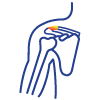
Weightlifter’s Shoulder (Osteolysis)
What is Weightlifter’s Shoulder (Osteolysis)?
Distal clavicular osteolysis or acromioclavicular (AC) joint osteolysis, is also known as weightlifter’s shoulder. It is characterised by a series of small fractures along the outer end of the collarbone.
Whilst classically described in weightlifters, heavy labourers are also susceptible to it, and in some cases it can be caused by direct trauma. As these fractures deteriorate, they increasingly erode the bones within the AC joint (which connects the collarbone to the shoulder blade).
What are the Symptoms of Distal Clavicle Osteolysis?
The most common symptoms include a dull ache over the acromioclavcular joint, pain and tenderness on top of the shoulder, swelling in the region, and a feeling of shoulder weakness. Weightlifters and heavy labourers usually feel significant pain in the shoulder after strenuous shoulder activity.
How is this treated?
AC osteolysis usually responds favourably to conservative treatment, with most cases treated effectively with some combination of rest, icing, anti-inflammatory medications, corticosteroid injections, and physiotherapy. The goal of our rehabilitation plan is to eliminate pain within six to eight weeks.
A minority of patients with AC osteolysis may require minimally invasive arthroscopic surgery, most of the time constituting removal of the end of the clavicle (also known as AC joint arthroplasty or Mumford procedure). Performed through tiny incisions, this minimally invasive arthroscopic procedure involves the removal of less than ten millimetres of the end of the clavicle and some recontouring of the AC joint. Surgery prevents the bones in the AC joint from grinding against each other, usually eliminating shoulder pain and restoring a complete range of movement. As a minimally invasive procedure, AC resection has a shorter recovery time than open surgery, with most patients going home the same day. The arm is rested in a sling for several days, and physiotherapy is then started. You may have some pain or discomfort following surgery, however this should subside within a few weeks. Most patients make a completely recovery after six to eight weeks of physiotherapy and rehabilitation.


